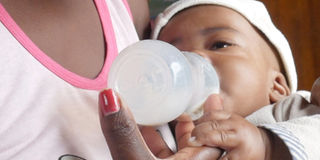How to choose baby formula

Formula is an ideal choice as a complementary feeding option for when breast milk is unavailable or inadequate. PHOTO | SHUTTERSTOCK
Breast milk has been proven as the best kind of milk for babies. But in instances where for some social or medical complications breast milk is not available, baby formula is the next best option.
There are many and brands of baby formula on the market today. This generous offering can be confusing when choosing formula for your baby.
Dr Mary Nyanzi stresses the importance of breastfeeding exclusively for the first six months of the baby’s life after which formula can be used for complementary feeding.
Dr Nyanzi says there is no brand of infant formula that is best for all babies; what may work for one baby may not work for another. Some babies have special medical conditions. When it comes to choosing an infant formula, you may need guidance from your baby’s doctor right from the start.
Paediatricians generally recommend a standardised infant formula that is fortified with iron. It should also meet the requirements of the regulatory authorities both locally and internationally.
There are four types of formula that exist on the market:
Cow’s milk based formula (standard formula)
This is formula whereby 80 per cent of the protein is from cow milk but processed so that babies are able to digest it.
Hydrolysed formula
This is also from cows milk but it is processed further so that the proteins are easier to digest. Commonly prescribed for babies that cannot tolerate cow milk or those with allergies.
Soy formula
This is meant for babies with cow milk allergy; those that cannot tolerate lactose.
Special formula
This is for babies with special medical needs and preterms.
According to Dr Nyanzi, infant formula also comes in three formulations; a powder for mixing, concentrated liquid for diluting and the ready to use formulation which is also a liquid.
“I would also recommend that one should stick to a product that works well for their baby, ensure proper hygiene, proper mixing and keep in touch with your paediatrician,” she recommends.
Remember AFASS
Julius Lwanga, a nutritionist from Kampala hospital says while choosing formula, the parent should follow the acronym AFASS.
“The formula chosen should be affordable for the parent since it is not good to make changes for the baby frequently. It should be feasible, easily and readily accessible and sustainable. For example some formulas are complicated to mix and store, the complications make it unrealistic for everyday use,” he advises.
Choosing formula is a critical decision since changing formulas may stress the baby.
If, a change is made it can take up to two weeks for the baby to adjust. If for some reason, you feel there is need speak with your doctor before changing to one of the specialty formulas.
Lwanga notes that while considering cost, powdered formula is the least expensive of all types of infant formula available. It is also more convenient to store although it is the most complicated to make; it needs to be frequently measured and mixed appropriately.
Although a little more expensive than powdered formula concentrated formula is a bit easier to prepare than powdered formula and hence there are fewer chances of making mistakes.
Ready-to-feed formula is the most expensive of all types of infant formula. It has more waste and is the heaviest to store; however, it is the most convenient as it does not require any additional water or mixing.
Formula feeding tips
It cannot be stressed enough that mixing the formula correctly is the most important part of feeding your baby. The brand one chooses will make little difference if it is not mixed correctly.
Also, watch out for the storage and hygiene of the utensils used since they can easily lead to bacterial infection.
Make sure you stick to your brand’s specific directions.
Tips
If your baby is experiencing reflux, blood in their stool or a rash it means they have an intolerance or allergy to the formula.
Apart from changing the formula, you can spend a little more time burping your baby to try to ease any stomach discomfort they may be experiencing swallowing too much air while feeding.
Provide a slower-flow nipple. A nipple with too fast of a flow can also cause your little one to gulp down too much air while eating. Level down to a nipple with a slower flow to see if that helps.




